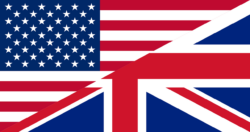
When we think of Britishisms, we usually think about that silent u they put in words like favour and the s they use instead of z in words like appetiser.
Another difference we see is that the British put their periods outside the quotation marks, whereas Americans put the period (and comma) inside the quotations.
And of course, they use different words for the same noun: flat instead of apartment, jumper instead of sweater, boot instead of trunk (of car), crisps instead of chips, postbox instead of mailbox, football instead of soccer, biscuit instead of cookie, and many more.
However, there are many grammatical differences between American and British English as well.
Have and take: The British say, “I am going to have a bath,” and the Americans say, “I am going to take a bath.”
Do substituting for a verb: “Are you coming with us?” “I might do.”
Use of needn’t: Americans usually do not use needn’t. We use don’t need: “You needn’t bother.” “You don’t need to bother.”
Use of shall: Americans tend to use will, and we have a specific use for shall. The British use shall more frequently.
At versus in/on: Americans generally say on the weekend, but the British say at the weekend.
Past tense: The British use more past tense constructions ending in t: dreamt instead of dreamed, learnt instead of learned, etc.
And there are more. One curious one is something a friend told me he has repeatedly heard British people do, which to us is an incorrect use of the reflective pronouns (the pronouns that end in -self). He repeatedly heard a flight attendant ask, “Can I get something for yourself?” instead of just saying for you as we would.
This last one I am going to talk about (because there are more if you want to look them up) is one where I use the British way, and I always taught it the British way because I believe it is the correct way. Most Americans do it the American way, which I always thought was incorrect, although generally no one really notices: With collective nouns, the British use a singular verb if the noun is thought to represent the group as a whole, and a plural verb if we are talking about the individuals in the group. For example,
- The band is having a picnic on Saturday after the concert. (Band is thought of as a group together.)
- The band are tuning their instruments. (Band refers here to the individuals.)
Americans tend to always use a singular verb. I just figure using the singular when you should use the plural is wrong.



The ‘ise’/’ize’ conflict is far more complex than simply British/American.
In British English, we used to use both. Verbs with a Latin root had an ‘ise’ ending and Greek had ‘ize’. Except if we turned a noun ending in CE to a verb when it always became ‘ise’. So we have ‘a practice’ but ‘to practise’ (a licence/to license, etc)
Even now almost every learned paper in British English will use this formula and be peppered with ‘ize’ endings.
BUT
When Microsoft and others produced the first spellcheckers they misunderstood and incorrectly only included ‘ise’ endings in the British English dictionary. It used to drive me mad when I first encountered them that they indicated my (correct) ‘ize’ spellings were incorrect. Nowadays, like most Britons, I just accept them.
Here we see a case of an American misunderstanding changing our language.
(And don’t get me started on ‘got’/’gotten’ or ‘snuck’!!!!)
Thank you for the additional information!
> Another difference we see is that the British put their periods outside the quotation marks, . . .
Is it not more nuanced than that? Perhaps the British prefer to put the period (full stop) where it belongs: if it belongs to the quotation, it goes inside; if it does not, it goes outside.
Here is the relevant text from Hart’s Rules [without italics].
When the punctuation mark is not part of the quoted material, as in the
case of single words and phrases, place it outside the closing quotation
mark:
Why does he use the word ‘poison’?
When a quoted sentence is a short one with no introductory punctuation,
the full point is generally placed outside the closing quotation mark:
Cogito, ergo sum means ‘I think, therefore I am’.
He believed in the proverb ‘Dead men tell no tales’.
He asserted that ‘Americans don’t understand history’, and that
‘intervention would be a disaster’.
Waddingham A (ed.). 2014
New Hart’s Rules: the Oxford style guide, 2nd edn, p. 164.
Oxford: Oxford University Press. 464 pp.
Thanks for the info. American English is more nuanced in the case of question marks and exclamation points. FYI – The use of words as themselves use italics and not quotation marks at all.
> FYI – The use of words as themselves use italics and not quotation marks at all.
Sure, but the comment window allows no formatting.
Sorry – You are right!
I taught English at a university in Thailand for 15 years. British English was standard in much of the English language media in Thailand, but we taught American English at our college. I always told the graduate students who were working on their theses/dissertations, “I don’t care which you use as long as you are consistent throughout the paper.”
Good rule to follow! Consistency!